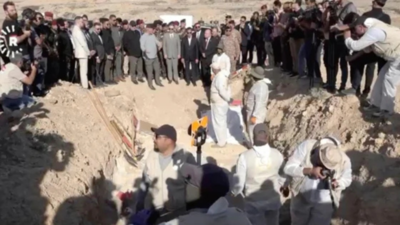ARTICLE AD BOX

Iraqi officials have begun excavating a mass grave near Mosul that potentially contains thousands of victims killed by the Islamic State (IS) during its control of the region a decade ago.
The excavation at al-Khafsa, located south of Mosul, involves coordination between local authorities, the judiciary, forensic investigators, Iraq's Martyrs' Foundation, and the directorate of mass graves, as reported by the Iraqi News Agency on Sunday.The initial phase of the excavation started on August 9 at the request of Nineveh province's governor Abdulqadir al-Dakhil. The current focus is on collecting visible human remains and surface evidence while preparing for a comprehensive excavation that will require international support.The Martyrs Foundation plans to create a database and begin DNA sample collection from families of suspected victims after the first 15 days of work. The site presents significant challenges due to its hazardous conditions."A very complicated site," said Ahmad Qusay al-Asady, head of the Martyrs Foundation's mass graves excavation department, noting that laboratory processing and a DNA database must be established before proceeding with full exhumations due to the presence of sulfur water and unexploded ordnance.
Based on unofficial testimonies and witness accounts, authorities estimate the site could contain thousands of bodies. The Islamic State's reign of terror left numerous mass graves across Iraq and Syria, containing victims of their brutal regime."The largest mass grave in modern Iraqi history," is how Rabah Nouri Attiyah, a lawyer who has handled over 70 missing persons cases in Nineveh, describes the al-Khafsa site based on information from the foundation and Iraqi courts.Al-Asady maintains a more measured stance, stating that investigators "cannot confirm yet if it is the largest mass grave" in Iraq, "but according to the size of the space, we estimate it to be one of the largest."According to Attiyah, approximately 70% of the remains are believed to be Iraqi army and police personnel, with other victims including members of the Yazidi community. Witness accounts describe IS fighters transporting people to the site by bus and executing them, with many victims reportedly decapitated.The Islamic State's rule extended across an area half the size of the United Kingdom, spanning Iraq and Syria. Their regime was marked by extreme brutality, including the beheading of civilians and the enslavement and rape of thousands of Yazidi women.The defeat of IS occurred in stages, beginning with Iraqi forces capturing Mosul in July 2017. Kurdish forces then took control of Raqqa, IS's de-facto capital in Syria, three months later. The war against IS officially concluded in March 2019 when U.S.-backed Kurdish-led Syrian Democratic Forces captured Baghouz, the last IS-controlled territory.



.png)
.png)
.png)
















 21 hours ago
3
21 hours ago
3









 English (US) ·
English (US) ·